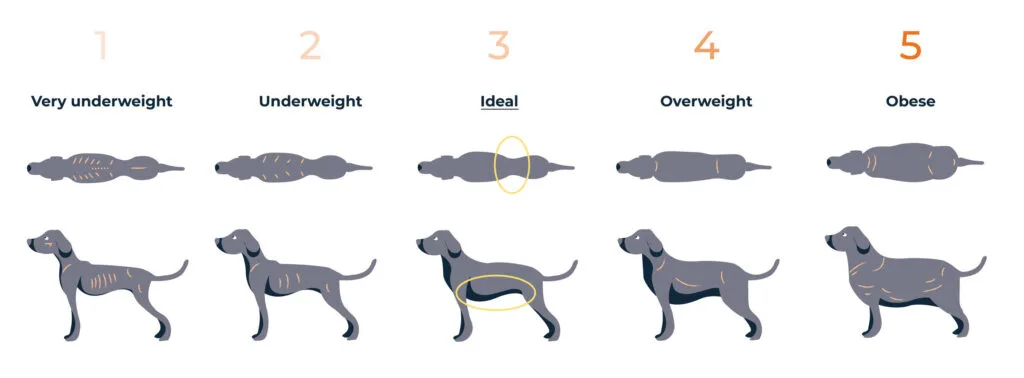I receive many questions about weight and size, in particular, addressing the issue of overweight or fat cocker spaniels. Why and how did this weight gain happen? and how do you go about fixing it?
I’ll explain how to really know if your spaniel is at the correct weight and what to do if they aren’t.
To check, run your hand down their side, and with light pressure, you should feel their ribs a little. If you can’t feel any ribs even with moderate pressure, and your spaniel is over the average weight then they are likely overweight.

How To Know If Your Cocker Spaniel Is Overweight
I know this can be challenging for owners, and I wasn’t sure either for a long time before thoroughly researching and speaking to vets. Most owners get caught up not knowing if their cocker spaniel is “just a little big” or actually overweight/fat.
Don’t just rely on the scales! The first big problem is that relying on the scales can sometimes be misleading. It is definitely still important but it’s only part of the overall picture.
1. Feel the ribs
Believe it or not, apart from numbers on the scale, the best way to gauge whether your cocker spaniel is overweight is to feel them.
If you run your hand along the side of your cocker spaniel you should be able to feel their ribs with minimal pressure.
Only a small layer of fat should cover them. You should also be able to feel your cocker spaniel’s spine the same way you can feel the ribs.
2. Check the waistline
Another check to make is purely visual. You should be able to see a healthy abdominal tuck, as the photo indicates below. Of course, be sure not to let the fur or long hair trick you. This gauge is purely for their body.

3. Check the scales
Of course, we do still need to check the scales. The scales can act as a final confirmation to determine whether your cocker spaniel is in fact overweight.
If your spaniel is over the breed standard, and you can’t feel their ribs or spine, then you can be pretty sure that they are on the tubby side of things. So how much should a cocker spaniel weigh? Let’s move on to that…
- Related article: Why Is My Cocker Spaniel Always Hungry?
How Much Should a Cocker Spaniel Weigh?
It’s crucial to remember that the averages below are for adults. Cocker spaniels will not reach their correct weight until around 13-15 months of age depending on whether they are male or female.
Until then, you can’t be certain that your spaniel hasn’t stopped adding mass.
Male Adult Cocker Spaniel Weight:
Weight: 28-34 pounds (12-15.4 kg)
Female Adult Cocker Spaniel Weight:
Weight: 26-32 pounds (11-14.5 kg)
After knowing these averages, how does your cocker spaniel fair? If your spaniel is towards the upper end or even slightly over, yet she doesn’t look overweight, you can feel her ribs and see a healthy tuck, then she likely is not overweight, rather just a bigger than average spaniel.
If your spaniel is over the upper end and on top that you cannot feel her ribs, then it’s likely she or he is fatter than normal and overweight.
Related: Cocker spaniel growth timeline and chart: puppy to adult
5 Reasons Why Cocker Spaniels Get Fat & Overweight
There is a range of reasons why a cocker spaniel may get fat in the first place. It could be one or a combination of the following factors. The only way to know is to consider your spaniels overall routine, lifestyle, and of course, diet.
1. Underlying health issues
Although not the most common cause, there are various underlying health issues that will contribute to weight gain. Hypothyroidism for example is a classic health issue that leads to slow metabolism and fat gain.
There is also the possibility that an underlying health issue indirectly causes weight gain by reducing overall mobility and activity, like hip dysplasia or joint issues. Granted, this will mostly only affect senior spaniels.
2. Table scraps
Any kind of human food, table scraps, or tidbits can seriously increase your cocker spaniel’s daily calorie intake. It doesn’t take a lot of table scraps to add up to a few hundred extra calories per day, which will certainly pile on the pounds over time.
With almost 40% of dog owners in the USA feeding their dogs table scraps, it’s one of the most likely causes of weight gain.
3. High calorie dog treats
Even if you aren’t feeding table scraps, there are many dog treats on the market that are simply way too high in calories.
From jerky treats, fatty biscuits, bones, and pigs’ ears, high-calorie treats can lead to weight gain quickly. While treats are an important tool for training, it’s crucial to be aware of how many calories are in each one.
4. Lack of exercise or activity in general
Cocker spaniels are bundles of energy and need quite a lot of exercise despite their size. 60-90 minutes of exercise per day is ideal for an adult cocker spaniel, which surprises most owners due to the fact they aren’t large dogs.
Most owners are admittedly under exercising their cocker spaniel on a daily basis.
5. Incorrect portion sizes for the type of food
Lastly, it could be down to portion sizes and the actual food your cocker spaniel is consuming. Portion sizes are admittedly hard to get right and cause a lot of confusion for many owners.
The issue is that while it’s easy to say 1 cup in the morning and another in the evening, not all dog food is made the same, and depending on its fat content can vary drastically in its calories.
So portion size is very much dependent on the exact brand you are using. More on this below.
Helping Your Cocker Spaniel To Lose Weight
Alright, let’s run through the best ways to safely help your cocker spaniel lose some weight.
Please note: Before trying the following, consider your spaniel’s health and current routine. If you suspect she may have health issues and other symptoms are present like food refusal, lethargy, vomiting, or diarrhea, then please consult your veterinarian.
Additionally, if you have a good idea that the cause is related to high-calorie treats or table scraps, only adjust those things. In general, you don’t want to try a range of things all at once, make a single change and see if improvements are made after a couple of weeks.
1. Cut out all table scraps
It’s important that everyone in the household gets on board and agrees not to feed the fluff ball any table scraps or human food.
All it takes is one cheeky pork sausage, and your spaniel will be over on their calories by as much as 200-300. Table scraps are simply far too high in calories, and quite frankly, unhealthy.
So much of our food contains strong allergens, spices, and toxic ingredients. Cutting it all out is a must for good canine health.
2. Reassess exercise routine
Cocker spaniels need 60-90 minutes of moderate to high pace exercise per day. Ideally, this is split up into two 45 minute sessions once in the morning and again in the evening.
Be honest and evaluate your spaniel’s activity levels… Could they do with more exercise? What about more playtime at home? All activity counts and will burn more calories. Cocker spaniel exercise article
3. Switch to low-calorie dog treats
It’s time to cut out all the existing dog treats and switch to a natural ingredient low-calorie dog treat. Zukes Mini Naturals are what I’ve been using for years and they are awesome!
Each treat is about 2 calories, that’s amazing compared to a whopping 100 calories for a single dog chew (depending on which one it is).
This can make a huge difference, and the best part is that you don’t have to stop rewarding your spaniel.
4. Check the calorie content of the kibble you use
Portion adjustments could be necessary. If you are feeding a premium kibble that focuses heavily on protein and fat then it’s likely going to contain more calories for less dog food.
The kibble you use may very well be working well, but if you are giving too much then it will eventually lead to weight gain.
Adult male cocker spaniels need between 900-1050 calories per day to maintain their weight. For females, it’s around 800-950 calories per day. This is of course just an average, but it is a start. Compare this to how much dog food you are giving and the calories contained.
Remember to add on the treats you give throughout the day, and see where you are at… If you realize your spaniel is receiving more than the upper range, it’s likely too much.
Something Fundamental To Consider
Calories in Vs Calories out is the basic formula for either weight gain or weight loss. Not just for us, but for our dogs and all animals.
Calories and activity are very much at the heart of this issue so adjusted portion sizes mixed with improved exercise could have a big impact in just a few weeks.
As long as your cocker spaniel is not eating an excessive amount of calories, then their weight should be at an ideal level. For those on the other end of the spectrum, it could be that they are exercising too much with too small portions or that the food is low-quality.
Ultimately, it’s all about calories consumed and calories burned. While it’s easier said than done (or in this case, written!) it’s crucial to take a step back and consider your spaniel’s daily routine, activity levels, and diet.
The cause of the weight gain could prove to be something very obvious assuming health issues are not at play.
Why It’s Important To Manage Your Cocker Spaniel’s Weight
If you have on your hands an overweight cocker spaniel, it is important to take action and bring their weight back down to a healthy level.
No dog should be overweight, especially active working breeds like cocker spaniels. These dogs are full of energy and absolutely love to be quick, agile, and full of life.
Weight issues (unless caused by unforeseen health issues) should not be something dogs have to deal with.
Just like in us, being overweight can lead to a myriad of further health complications for our pet friends. These include:
● Heart disease
● Kidney disease
● Respiratory disease
● Cancer
● High blood pressure
● Diabetes
● Osteoarthritis
And the list is still much longer.
Experts have stated that if anything, it’s healthier for a dog to be slightly underweight than it is overweight. We aren’t advocating to make your spaniel underweight, but it just goes to show that they certainly shouldn’t spend much time on the heavier end of the spectrum.
So with a longer healthier lifespan in mind for your cocker spaniel, it’s worth fixing their weight issue if they have one.
When To See a Vet
When it comes to looking after your cocker spaniel, your veterinarian is always there to help you.
If you suspect something is wrong, or you just don’t know how to start tackling this issue (even after this super helpful blog post!) then it’s definitely okay and recommended to contact your veterinarian.
Veterinarians are well-versed in dealing with weight problems in canines, and they should help you with a tailored plan to get your cocker spaniel back on track.
Other times I would say it’s crucial to contact your veterinarian is if your cocker spaniel has additional symptoms like lethargy, food refusal, vomiting, diarrhea, nausea, or just isn’t their usual self. In those cases, speak to your veterinarian as soon as possible.
Back to more Cocker Spaniel articles
Additional resources:
- https://vcahospitals.com/know-your-pet/obesity-in-dogs
- https://www.winston-salem.carolinavet.com/site/pet-health-advice-blog/2021/02/28/overweight-dog
- https://todaysveterinarypractice.com/nutrition-notes-treatment-of-obesity/
